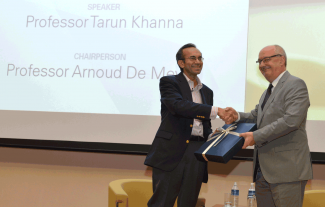
Venturing into, and gaining a foothold in developing countries has always been the expansion game plan of the multinational companies (MNCs). Most Western multinationals that are zealously seeking entry into emerging markets tend to overlook the challenges which come in different hues and varying proportions as they attempt to force-fit conventional business thinking and models to these developing countries, with scant regard for the understanding of local mindsets and the navigating of tricky business environments.
This is a common fallacy that invariably results in abject failures for MNCs in their quest to penetrate the emerging markets, so observed Professor Tarun Khanna, Director of Harvard University’s South Asia Institute and Jorge Paulo Lemann Professor of the Harvard Business School, when addressing some 200 members of audience comprising faculty, staff, students and alumni at the SMU Presidential Distinguished Lecturer Series (PDLS) on 21 February 2013 at the Mochtar Riady Auditorium. He was the 11th eminent speaker to grace PDLS since its inception eight years ago.
In the book, “Winning in Emerging Markets: A Road Map for Strategy and Execution”, which Professor Khanna co-authored with Professor Krishna G. Palepu, a fellow faculty at the Harvard Business School, he also expounded on the pathways that MNCs need to chart to roll out their businesses successfully in developing countries. He argued that the key differentiator between emerging and mature markets is the ease with which buyers and sellers come together. While developed markets have a structured framework which greatly facilitate commercial interactions, emerging markets lack such enabling mechanisms, which he terms as “institutional voids”. These intermediaries, which provide the requisite backbone for transactions, would include physical infrastructure, credit card issuers, intellectual property-adjudication, market research firms, head-hunters, and so on.
Professor Khanna further commented that the presence of intermediaries is miniscule in the emerging markets. Coupled with a lack of infrastructure and institutions needed for efficient business operations, such institutional voids could be stumbling blocks to the MNCs. The key to achieving success in developing economies would, therefore, be spotting these voids and circumventing or filling them.
During his talk, Professor Khanna presented a systematic framework for assessing the institutional context and potential of an emerging market, and he cited examples of some MNCs which have successfully evolved their segmentation strategies, adapted their business models and changed managerial mindsets to establish a presence in the emerging markets. These included L’Oreal (the world’s largest cosmetics and beauty company); Bunge (a leading agribusiness and food company founded in Amsterdam but has footprints in 40 countries globally today) and Metro AG (a diversified retail and wholesale/cash-and-carry corporation). Local firms that have navigated the challenging environments in their own country (India) and innovatively scaled their business included Aspiring Minds, a Gurgaon-based talent assessment and placement company, and Narayana Hrudayalaya Hospitals, the world’s largest and most prolific cardiac hospital headquartered in Bangalore.
[Featured photo: SMU President, Professor Arnoud De Meyer (right) presenting a token of appreciation to Professor Tarun Khanna (left) at the Presidential Distinguished Lecture Series held on 21 Feb.]